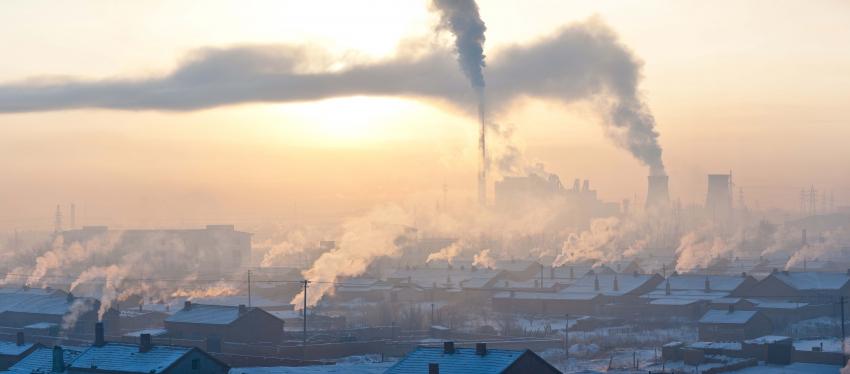Tougher climate policies can save 153 million lives says a new study
As many as 153 million air pollution deaths would be avoided if governments speed up the timetable for reducing fossil fuel emissions, a new Duke University study finds. [This article first appeared on LongevityFacts. Author: Brady Hartman. ]
There is an overlooked benefit to lowering carbon emissions, besides reducing sea-level rise, a new study says.
Reducing emissions will likely save about 153 million human lives if the nations of the world agree to cut enough emissions to limit global temperature rise to less than 1.5°C (2.7 degrees Fahrenheit), by the end of the century. That is about a degree lower than the target set by the Paris climate accords.
Premature deaths would drop in every major city on the planet, saving the highest number of lives in Asia and Africa. Air pollution causes premature deaths and has well-documented ill effects on lung and heart health, increasing the risk of heart attack and stroke as well as respiratory disease.

Stricter regulations since the 1970’s have cleaned up the air in the United States. Even so, more than 330,000 lives in Philadelphia, Detroit, Atlanta, Los Angeles, New York, San Francisco, Pittsburgh, and Washington would be spared if greenhouse gas emissions were reduced on a shorter timetable than is currently planned, according to a new study published March 19 in the journal Nature Climate Change.

Lead study author Drew Shindell, Ph.D., professor of Earth sciences at Duke University told the Washington Post,
“Americans don’t really grasp how pollution impacts their lives”
The new study is the first to estimate the number of lives that could be saved, city by city, in more than 150 large urban areas throughout the world.
Shindell’s estimates hinge on governments reducing carbon emissions and limiting global temperature rise to 1.5°C (2.7° F) instead of postponing the biggest emissions cuts until later, as is proposed.
The most massive savings of human life would occur in Kolkata and Delhi, India, where accelerated emissions cuts would save around 4 million lives apiece. Thirteen other cities in Asia and Africa could avoid more than 1 million premature deaths each. Approximately 80 additional urban areas could avoid at least 100,000 deaths apiece.
In larger urban areas such as Moscow, Mexico City, New York, Los Angeles, Puebla and Sao Paolo, between 120,000 and 320,000 premature deaths would be prevented in each metropolis.
How Air Pollution Harms Our Health
Shinell’s assertion that air pollution is responsible for massive deaths worldwide is bolstered by an October 2017 report in The Lancet, which reported that pollution was responsible for one in six global deaths in 2015, with the majority of those deaths due to air pollution.
Numerous studies show that air pollution contributes to heart disease and stroke, chronic lower respiratory diseases, Alzheimer’s disease and dementia, cancer, and type 2 diabetes.
Air pollution contains toxins that generate free radicals which damage the tissues in our heart, lungs, and blood vessels, leading to an acceleration in chronic diseases in these organs. Free radicals damage our cells and tissues, causing telomere shortening as well as DNA damage which leads to accelerated cell death and cellular senescence.
Pollution Deaths on the Installment Plan
According to professor Shindell, the new forecasts underscore the grave shortcomings of reducing emissions based on cost, rather than human lives. Under current proposals, governments intend to permit higher emissions in the short-term in the hopes that negative reductions in the distant future can offset them. As Shindell puts it in a Duke news release accompanying the study,
“The lowest-cost approach only looks at how much it will cost to transform the energy sector. It ignores the human cost of more than 150 million lost lives or the fact that slashing emissions in the near term will reduce long-term climate risk and avoid the need to rely on future carbon dioxide removal,” adding “That’s a very risky strategy, like buying something on credit and assuming you’ll someday have a big enough income to pay it all back.”
Shindell and colleagues ran computer simulations of future emissions of carbon dioxide and associated pollutants such as particulate matter and ozone under three different scenarios. The first scenario simulated minimal reductions now, followed by negative emissions in the future. The second scenario simulated slightly higher carbon emissions in the near term, but with still enough overall cuts to limit atmosphere warming to 2°C by century’s end. The third scenario simulated an even more accelerated approach, advocated by Shindell, which rapidly reduces emissions to a level that would restrict atmospheric warming to 1.5°C.
The scientists then calculated the health impacts of pollution under each scenario, on a city-by-city basis, using established epidemiological models based on decades of data on air-pollution-related deaths, as Shindell said,
“Since air pollution is something we understand very well and have extensive historical data on, we can say with relatively high certainty how many people will die in a given city under each scenario.”
The Duke researchers calculated that up to 153 million deaths could be avoided under the third scenario. The models estimated about 7 million premature deaths per year if the nations of the world fail to work toward zero emissions by the end of the century, starting today. Shindell makes a case for action, saying
“Hopefully, this information will help policymakers and the public grasp the benefits of accelerating carbon reductions in the near term, in a way that really hits home.”
Even so, it is an unrealistic goal, given that developing nations such as India, where air pollution is among the worst in the world, argue that their per capita energy use is small compared with the West and that they should be allowed time to develop.
Black carbon sulfate air pollution. Visualization courtesy of NOAA.
Pollution Ignores Borders
While the nations that produce the most air pollution also bear the bulk of deaths that result, particulate matter travels from one country to another. Air pollution causes significant problems in Western nations with tighter regulations, as a toxin released in China or India can end up in Los Angeles just as easily. In fact, scientists reported that a significant proportion of air pollution in Western US cities comes from burning coal in China.
Last year, a study published in Nature pointed out that air pollution does not respect borders and about 12 percent of premature deaths are caused by pollution released somewhere else in the world. Nature study co-author Qiang Zhang, a scientist at Tsinghua University in Beijing, told PopularScience
“Air pollution can travel long distances and cause health impacts in downwind regions.”
Dabo Guan, a researcher at Tsinghua University and a co-author on the study, also told PopularScience
“Previous research believed that pollution was a local issue and did not require global efforts” adding “My point here is that we’re a globally connected, intensively connected world. No one has a way out of the impact because we are either producers or consumers. Sometimes we are both.”
Air Pollution Negates Longevity Gains
In our bid to live healthier lives, some of us refrain from smoking, eat a healthy diet, and exercise. Moreover, medical advances over the past century have significantly extended human lifespan, and we can expect more of the same.
However, unless the growth in emissions is drastically reduced, a December 2017 report says that air pollution will rise to the top cause of death in the next three decades, canceling out many of these health and longevity advances.
You can support the global fight against air pollution by visiting the GAHP website, which stands for the Global Alliance on Health and Pollution.
Related: New study suggests that traces of lead causes deaths on par with smoking.
Like this Article?
- Help us spread the word – Click on any social media link to share this article.
- Follow us on social media – Google+ or Reddit
References
Cover Photo: Getty Images.
Disclaimer
Diagnosis, Treatment, and Advice: This article is intended for informational and educational purposes only and is not a substitute for qualified, professional medical advice. The opinions and information stated in this article should not be used during any medical emergency or for the diagnosis or treatment of any medical condition. Consult a qualified and licensed physician for the diagnosis and treatment of any and all medical conditions. Experimental drugs, therapies, and treatments carry a much higher risk than FDA-approved ones. Dial 9-1-1, or an equivalent emergency hotline number, for all medical emergencies. As well, consult a licensed, qualified physician before changing your diet, supplement or exercise programs.
Photos, Endorsements, & External Links: This article is not intended to endorse organizations, companies, or their products. Links to external websites, mention or depiction of company names or brands, are intended for illustration only and do not constitute endorsements.
